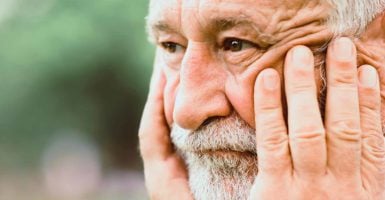Recognising Dementia Symptoms: What to Look Out For

In this article:
Quick summary:
Caring for someone you love means watching for changes that matter. When it comes to dementia, spotting the early warning signs can make all the difference in getting the right support and planning in place for the future. But how do you tell the difference between normal ageing and something more serious?
Every year, approximately 209,600 people in the UK develop dementia. That’s roughly one person every three minutes. If you’re worried about a family member or friend, you’re not alone in feeling uncertain about what’s normal and what isn’t.
Understanding the Difference Between Normal Ageing and Dementia
We all forget things as we get older. Misplacing keys, struggling to remember someone’s name, or losing track of where you parked the car happens to everyone. But dementia is different.
Normal ageing might mean occasionally forgetting a word during conversation but remembering it later. With dementia, someone might forget common words entirely or use unusual words instead. They might call a watch a “hand-clock” or struggle to follow conversations they’d normally handle with greater ease.
The key difference is impact. Normal memory lapses are frustrating but don’t significantly affect daily life. Dementia symptoms disrupt everyday activities and gradually get worse over time.
Early Warning Signs That Matter
Memory Changes That Go Beyond Forgetfulness
When someone develops dementia, their memory problems become more noticeable and concerning. They might:
- Forget conversations that happened just hours ago
- Ask the same questions repeatedly, even when you’ve just answered them
- Struggle to remember important dates like birthdays or appointments they’d never normally miss
- Need constant reminders for things they used to manage independently
- Forget familiar people’s names, including close family members
What makes this different from ordinary forgetfulness is the frequency and impact. These aren’t occasional lapses but regular occurrences that affect their daily routine.
Getting Lost in Familiar Places
One of the most concerning early signs is when someone becomes confused about where they are or how they got somewhere. This might start small – taking longer to find their way around the local shops or getting confused about which bus to take home.
As symptoms progress, they might:
- Get lost walking to places they’ve visited hundreds of times
- Forget where they are while out and about
- Lose track of dates, seasons, or even what year it is
- Struggle to understand how much time has passed
Problems with Daily Tasks
Activities that were once second nature can become increasingly difficult. This isn’t about major tasks but simple, familiar activities like:
- Following a recipe they’ve used for years
- Managing money or paying bills
- Operating household appliances they’ve used regularly
- Getting dressed appropriately for the weather or occasion
- Maintaining personal hygiene
Changes often happen gradually, which means they can be easy to miss at first.
Communication Difficulties
Language problems in dementia go beyond the occasional “senior moment.” Someone might:
- Stop mid-sentence and be unable to continue their thought
- Struggle to find the right words for everyday objects
- Have trouble following or joining conversations
- Repeat stories or questions without realising they’ve already shared them
- Find reading and writing more challenging
Changes in Thinking and Judgement
Dementia affects how people process information and make decisions. You might notice:
- Poor judgement about money, such as giving large amounts to strangers or falling for scams
- Difficulty planning or organising activities they used to handle easily
- Problems with reasoning through everyday situations
- Trouble understanding visual information or spatial relationships
These changes can put someone at risk, particularly around financial decisions or home safety.
Personality and Behaviour Changes
Perhaps the most distressing aspect of dementia for families is watching personality changes. Someone who was always calm might become easily agitated. A naturally sociable person might withdraw from activities they used to enjoy.
Common changes include:
- Increased irritability or mood swings
- Loss of interest in hobbies or social activities
- Becoming suspicious of family members or carers
- Changes in sleeping patterns
- Inappropriate behaviour in social situations
These changes happen because dementia affects the parts of the brain that control personality and behaviour.
Physical Symptoms and Daily Living Challenges
As dementia progresses, physical symptoms often develop:
- Coordination problems and increased clumsiness
- Balance issues and higher risk of falls
- Changes in walking pattern
- Difficulty with fine motor skills like writing or using utensils
- Problems with personal care and hygiene
Different Types of Dementia Show Different Patterns
Not all dementia looks the same. Alzheimer’s disease typically starts with memory problems, while vascular dementia might begin with planning difficulties. Lewy body dementia often involves visual hallucinations and sleep problems, whilst frontotemporal dementia primarily affects personality and behaviour early on.
Understanding these differences helps explain why someone’s symptoms might not match what you expect from dementia.
When Symptoms Come and Go
One confusing aspect of some types of dementia is that symptoms can fluctuate. Someone might seem quite clear and capable one day, then confused and forgetful the next. This is particularly common with Lewy body dementia.
These “good days and bad days” can make it harder to recognise that something’s wrong, but they’re actually an important clue for doctors making a diagnosis.
What to Do If You’re Concerned
If you recognise several of these signs in someone you care about, it’s important to seek medical advice. Many people resist the idea of seeing a doctor about memory problems, often because they’re frightened of what they might discover.
Here are some practical approaches:
- Suggest a general health check-up rather than focusing specifically on memory concerns
- Offer to accompany them to the appointment for support
- Contact their GP surgery to discuss your concerns if they’re reluctant to seek help themselves
- Keep a diary of symptoms to share with healthcare professionals
Your GP can arrange initial assessments and refer to specialist services if needed, often called Memory Assessment Services or Memory Clinics.
Getting the Right Support
A dementia diagnosis can feel overwhelming, but it’s also the first step towards getting appropriate support. Early diagnosis means:
- Access to treatments that might slow progression
- Time to plan for the future while the person can still be involved
- Connection with local support services
- Opportunity to make legal and financial arrangements
The Alzheimer’s Society offers excellent resources for families and local support groups throughout the UK.
Remember: Many Conditions Can Mimic Dementia
It’s crucial to remember that many other conditions can cause symptoms similar to dementia, such as depression, infections, vitamin deficiencies, thyroid problems, and side effects from medication.
This is why professional assessment is so important. Many of these conditions are treatable, and symptoms can improve significantly with the right treatment.
Moving Forward with Confidence
Recognising potential dementia symptoms takes courage, but it’s an act of love and care. Whether concerns lead to a dementia diagnosis or reveal a treatable condition, seeking help is always the right choice.
Every person’s journey with dementia is different, but with the right support, it’s possible to maintain quality of life and meaningful relationships. The key is not waiting – the sooner you seek help, the more options you’ll have for managing whatever lies ahead.
If you’re caring for someone with dementia or worried about early symptoms, remember that you don’t have to navigate this alone. Support is available, and taking that first step towards getting help is often the hardest part.
How to get started with Dementia care?
When you’re just starting your care journey, it’s important to answer as many questions as possible to ensure you make an informed choice. Please do reach out to our experienced care team who will be able to answer any questions you may have.
If you’re ready to find out what home care options are available in your area:
or talk to our care team today on 01865 951 350



